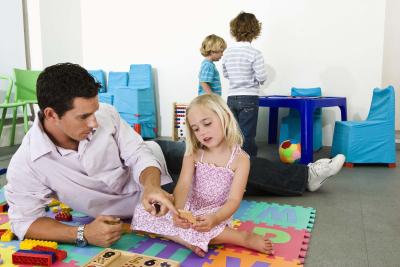Memory problems cause failed quizzes, forgotten homework and lost possessions for some children. The issues created by poor memory can lead to stress. Several conditions, including attention deficit hyperactivity disorder, known as ADHD, list poor memory as a side effect of the disorder. Knowing what causes poor memory and what to do about it will help you help your child.
Why It Matters
Memory problems for a child have a significant impact on his daily life. Much of a young child’s learning is built on memory. Remembering names of objects or favorite foods are essential skills to future language development. Poor memory for a school-aged child becomes more serious. Forgetting a math lesson stunts his ability to build with the next steps. Forgetting homework impacts grades which leads to self-esteem issues. Remembering what he was asked to do when he got home from school shows an ability to be trusted with more independence. A child with memory problems can become frustrated when he cannot succeed.
What It Means
Poor memory skills is a hallmark trait of children with ADHD. Brain damage from seizure disorders, as well as developmental delays due to premature birth, can lead to memory problems in children. According to a 2003 study published by the Institute of Child Health at the University of London, some memory problems are related to short-term memory, which is needed to keep information in the brain to use in the immediate future. For example, when a child is asked a question, his working memory retains the question as another area of the brain retrieves the answer. If the working memory malfunctions, the question is forgotten before the answer can be retrieved.
Long-term memory is used to retrieve information that has been filed away. An inability to recall a person’s name a week after being introduced to him is an example of long-term memory issues.
How To Know
Diagnosing children with memory problems is not difficult. There are several memory related games and tasks the pediatrician can use. Once the memory problem has been established, figuring out what caused it is harder, if the child is not already diagnosed with ADHD, seizures or other obvious causes.
Make Remembering Fun
Playing games that involve memory is a fun, low-stress method to help a child improve her memory skill sets. At school, children with memory problems should write down instructions as the teacher gives them. This will help reinforce what is being requested. You can teach your child to attach familiar memories to new information. For example, remembering a teacher’s name will be easier if your child reminds himself upon meeting her that her name rhymes with his favorite cartoon character’s name. Keeping a small notebook to write down homework assignments and other things he wants to remember will make his life less stressful.
When to Seek Medical Assistance
Contact your medical care provider if your child’s memory suddenly seems to get worse or is adversely affecting his self-esteem. If the memory loss follows a head injury or is extremely severe, such as he cannot remember names of pets or siblings, seek emergency medical care.





